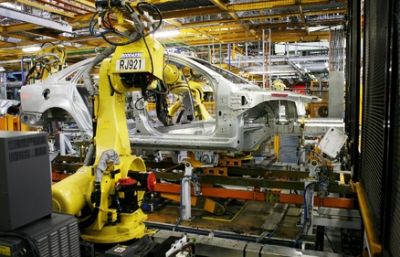
Robohub.org
Are investments in robotics capital intensive?

In a recent post in IEEE Spectrum Automaton, Robert Morris abstracted a paper he wrote with Richard Green, a finance professor at CMU. The thesis of his article is that robotic ventures are not capital intensive but instead are capital efficient. Both are financial terms:
- capital intensive: (of a business or industrial process) requiring the investment of large amounts of money
- capital efficient: the informal ratio of output divided by capital expenditure; the larger the ratio, the better the capital efficiency
A simplistic example of the use of these terms can be seen in the case of a cruise line operator that wants to build a new luxury liner. With its experience as an operator it knows what the metrics have to be to operate a profitable ship. And those metrics are detailed to the efficiency of the various divisions of the ship: food, power and fuel, operations, hospitality, location costs, amortized refitting costs, etc. Based on all that knowledge and experience they design a ship and search for a yard that has the assets, space and time to build it for a cost that will enable it to operate at a profit. Thus the yard is capital intensive, the project (building the ship) is capital intensive and the operation of the ship, once launched, is, hopefully, capital efficient.
Morris, a 2013 graduate of CMU’s MBA program and presently founder and CEO of TerrAvion, an aerial data start-up in Silicon Valley, was attempting to refute a statement by noted NY Times economist Paul Krugman when he said that robotic technological ventures were capital intensive. Morris believes that Krugman’s statement is reflective of an incorrect myth about the robotics industry – that robotics ventures are capital intensive – and that the myth is incorrect and its perpetuation in schools and with VC’s is influencing the creation of robotic businesses.
To prove his point, he examined 10 publicly-traded American robotics companies and found that their balance sheets had a large proportion of short-term investments and cash (instead of long-term assets and debt), significant revenue generated from assets, and sizable profits in comparison to the amount of corporate assets.
The characteristics Morris found in his study are characteristics that others have found to be reflective of successful businesses: cash-heavy, significant revenue generated from limited assets, and sizable profits in comparison to the amount of assets.
What Krugman was referring to was not the ongoing operations of a successful business but the costs of starting a robotics-related venture. Any start-up that has a hardware component as well as a software element has a longer lead time and may require more capital than one that is software-only. There are just more things going on in such an enterprise.
There’s nothing wrong or off-putting about that. In fact, VC’s these days are searching for start-ups with hardware components because they often lead to a very profitable business model of continuous software upgrades and infrequent hardware changes (think PCs and operating systems or da Vinci Systems and replenishing disposable tools and devices).
Robotics ventures are accellerating as technology provides cheaper, smaller, more capable components and universities and others stimulate entrepreneurs to find solutions to pressing problems with robotics. The financial community, not just regional VCs, has begun to focus on the robotics and automation industry. BoA/Merrill, Credit Suisse, MIT and others have released year-end reports suggesting that technological trends to watch in the immediate future include robotics and advanced manufacturing. These folks know about capital efficiency and capital-intensive investments and their interest is peaked (not thwarted) – which is great for the industry.
tags: c-Business-Finance


